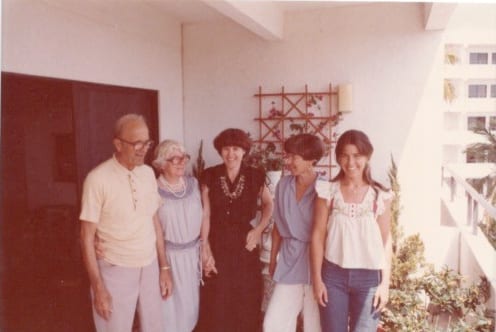
Me with my parents, sister and niece in Florida at my parents’ condo. In less than a decade my sister and I would care for my dying mother here.
This is Suzanne’s story as told to Cara Olexa by her daughter. Our “Opening Our Hearts” stories are based on people’s real-life experiences. By sharing these experiences publicly, we hope to help our readers feel less alone in their grief and, ultimately, to aid them in their healing process. In this story, Suzanne talks about caring for her mother as she died from cancer and grieving the love her mother didn’t show to her or her father.
My mother knew what she wanted, and she was very good at doing what she wanted to do. When she got her cancer diagnosis in 1983, she said she’d had a good life and was ready to die. So dying is just what she did, and she did it in style.
I was surprised by how well my mother took her dying. She called everybody she knew to tell them. Everyone loved her, and everyone was distraught that she was going to die. Some people immediately wanted to visit. My mother ate it up. She had a great time; she was really happy. She was 87 but still the life of the party. People brought her gifts, fun stuff like T-shirts with funny sayings. Someone brought her a hat, a 1920s bucket hat with pink taffeta roses. She’d wear it down to the pool at the condo. It was like my mother was a queen or a movie star. When people visited, she’d put on all her jewelry and makeup. There was always beer in the fridge. My mother loved beer. It was her last meal, actually, but I’ll tell that part later.
That’s how my mother would tell the story of how she died. When I tell it her way, I hear myself leaving out my father, my sister, and me.
My mother also knew what she didn’t want. She didn’t want to be a mom, not deep in her bones, not if it meant yielding a part of herself. She didn’t want to be in love with my father, or at least that’s how it looked to me. She just wasn’t good at doing things she didn’t want to do.
I remember my mother saying that treatment would “drag it out.” […] She said, “What’s the point?” I don’t think it hit me until after she died how hard it was for me to hear her say that.
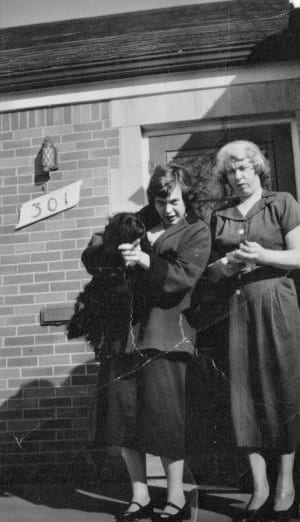
A rare photo of my mother and me when I was in my teens. I’m holding my beloved dog Cinders, who was my cherished companion.
My mother had esophageal cancer, and when she got the diagnosis, she immediately knew she didn’t want any more tests or X-rays or surgery, nothing like that. She told me this in the car right after the oncology appointment, on the way back to her condo at the independent living facility where she lived. (Independent living was in the same complex as my dad’s assisted living, in Shell Point, Florida. My parents lived in the condo together until my father was diagnosed with Parkinson’s.) I remember my mother saying that treatment would “drag it out.” She called it ridiculous. “I’m 87,” she said. “What’s the point?” I don’t think it hit me until after she died how hard it was for me to hear her say that.
I’d started taking care of my parents, helping them with things like grocery shopping and doctor appointments, when they were still in their 70s. My husband and I moved to Fort Meyers not long after my parents bought the condo, to be closer to them. Our kids were grown and my husband did a lot of business in Tampa and Orlando, so it worked out. So, I was the one who called my mother’s physician when she complained to me that it had gotten harder for her to swallow. I was the one who called the oncologist that her physician referred us to. I didn’t tell my mother how frightening it was for me to make those phone calls or drive her to those appointments.
When my mother was dying and having a great time, I wanted her to be as devastated and frightened as I was … I wanted some small part of her to want to be my mother instead of being dead.
I’d made frightening phone calls about my father’s Parkinson’s too, but it was different with my father. His Parkinson’s was devastating for him. I was devastated too, and now I think I really needed that from him—I needed him to suffer at least as much as I was suffering (he suffered more, of course). That sounds wildly selfish. But when my mother was dying and having a great time, I think I wanted her to be as devastated and frightened as I was, and when she wasn’t, I felt like a shattered plate. I go back and forth about whether I’m just as selfish as my mother.
My mother had the right to be done living, to say no to treatment she didn’t want—I believe in that with all my heart. I think it’s just that, even after fifty-plus years of knowing my mother, knowing exactly how she was, I still wanted her to be a little sad, too, that dying meant she wouldn’t get to be my mother anymore. I wanted some small part of her to want to be my mother instead of being dead.
While my mother busied herself with the fun parts of dying, I called my sister on the West Coast, and she flew in to help with the work. We both moved into our mother’s condo. That’s another story, what it was like living with my sister again for three months.
And it was exactly three months, like the oncologist said. His name was Dr. Frank, and he was frank. They were a good match, him and my mother. My mother always liked doctors. Dr. Frank looked like he was around my age at the time, somewhere in his fifties, a silver-fox type. My mother liked telling her visitors about her “very handsome oncologist,” but since she refused all treatment, she didn’t see him as much as she might have. But I remember sitting in the chair next to my mother in the exam room when he said, “You have esophageal cancer.” Without missing a beat, my mother said, “How long do I have?” and he said, “Three months.” He even gave her a date, October 10. I was still in free fall from the word cancer as he counted the months on his fingers: August, September, October. My mother just nodded and said, “Thank you, doctor.”
My parents were both progressive people in a generation that was very traditional and struggled to question the way things had always been done.
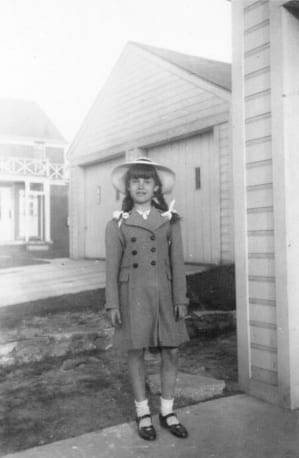
Standing alone in front of my childhood home.
I was already learning to be self-sufficient
and take care of myself.
She was pragmatic in a way I’ve always thought of as very European, very early-1900s immigrant. In this way she was very different from my father. He was sensitive and sentimental, even though he also grew up very poor and came through Ellis Island around the same time (they came over separately and met here). My parents were both progressive people in a generation that was very traditional and struggled to question the way things had always been done. My mother loved to play bridge for small change and drink beer (that’s why she and my husband got along so well). My father was definitely the breadwinner, but he was that taxi driver who talked about nature and philosophy.
But I always knew my parents weren’t in love. Or, maybe my father had loved my mother. He was a sensitive, emotional person. When I told my parents my husband and I were talking about getting married, it was my father who said, “You have found a man who knows what love is.” But I never heard him say anything like that to my mother.
For her part, she said she craved romance. She read romance novels endlessly. They were all over the house even when I was young. Sometimes she complained to me that my father never gave her the romance she wanted. I remember her doing that even when I was in high school.
My sister told me a story once, however, about stopping by our parents’ house unannounced and catching them in bed together. So maybe there was something there. Or, maybe it was just sex. I don’t know. But they were definitely a mismatch. Maybe it made my mother colder than she might have been.
I never called her “Mom.” She was always Mother. Even my father called her Mother.
She wasn’t a terrible mother, but she had never been there for me 100%. I had to fend for myself. It’s hard to explain it to other people. If I say she never combed my hair or made me breakfast or made sure I took a bath—and I truly don’t remember her ever doing these things—people want her to be a monster. But she wasn’t. My parents had grown up very poor, and they made sure my childhood was comfortable. My mother cooked dinner every night and kept the house clean. Maybe she thought that was enough. My dad drove a taxi and always did well, so there was never fighting about money. My sister and I took piano lessons and had friends over. It was very normal, in a lot of ways. But my mother was always in her own world, doing projects or visiting with her friends. I didn’t think of it this way at the time, but it was like she lived her own life and expected each of us to be doing the same.
I think that as my mother got older, I wanted to take care of her in part because I still wanted her to take care of me. Maybe I still held out hope that she just didn’t understand what taking care of someone looked like. Maybe I thought that if I showed her, she’d finally get it.
I don’t like saying that my mother didn’t want to take care of me. It feels unkind to say it, even though I believe it’s true.
After the paramedics came, I ran down to find my mother at the pool. She didn’t want to come to the hospital with me.
My mother could be unkind too. She wasn’t cruel; it was like she just didn’t understand we wanted her to care. I remember the day my father fell and went to the hospital, which is how they finally diagnosed his Parkinson’s. I was in the condo with him. He hit his head on the counter the way down. I was terrified he’d had a stroke. After the paramedics came, I ran down to find my mother at the pool. She didn’t want to come to the hospital with me. I went to the condo to call my husband, and when I got back to the pool, my mother was telling one of the neighbors that she had her eyes on a wealthy doctor who lived in the complex. I was shocked. I remember yelling, “He’s not even dead yet!” (He actually outlived my mother by a couple years.)
My daughter happened to be in town that day and met me at the hospital, and I remember I kept telling her, “I can’t believe her, I can’t believe her,” over and over.
I don’t know why I was constantly surprised by my mother.
Here’s another surprise that wasn’t a surprise: October 10 was, in fact, the day she died. I still wonder if that was a self-ordained death sentence or just a fluke. Or maybe Dr. Frank was just that good. I’ll never know.
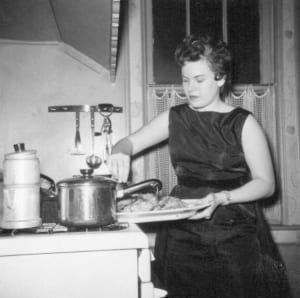
I had to teach myself to cook, but I was a quick learner. Here I am cooking for my husband in our first home.
My mother’s goodbye party didn’t last forever, of course. Her ability to eat diminished, and she lost weight and got weaker and weaker. Caring for her took more and more effort. But my sister’s daughter, who was a nurse, told us about hospice care. Back then hospice had only been around for about a decade, and we were lucky to find out about it. The hospice nurses were amazing. They set up my mother’s hospital bed in the living room of the condo. They walked us through every single step. I don’t know what we would have done without them.
So much of my mother’s dying was about food. She ate less and less and started asking for only certain foods, soft sweet things. There was a point where I was feeding her baby food. I could only feed her a teaspoon every hour, but I wanted to get food in her. Then she reached a point where she couldn’t take any food and couldn’t stand even the smell of food, so my sister and I started eating only cold food, and we ate in the bedroom.
My mother had always been thin, but I couldn’t believe how much thinner she got. She felt hollow, like a bird. Her elbows and knees were knobs on sticks. They made me think of flamingo legs. I remember the day I bathed her and she didn’t have armpits. My sister must have been out running errands because I remember calling my daughter right after that bath. I had to say it to someone: “She has no armpits.” My mother was just wasting away so much.
One time I checked on her and she woke up saying, “The spaghetti just slid off the table.”
She had her wits about her the whole time, though. When the hospice workers first started giving her morphine, she said, “Oh, this is why these young kids like drugs.” She started hallucinating. A lot of the time it was about food. One time I checked on her and she woke up saying, “The spaghetti just slid off the table.” Food filled her dreams. I’ve never been hungry like that, let alone that hungry while wanting absolutely no food.
Eventually she couldn’t even swallow liquids anymore. But the last thing she wanted to taste was beer—another surprise that wasn’t a surprise. We put some in her mouth so she could taste it, and then she had to spit it out. I call it her last meal even though she couldn’t actually swallow it. I like telling the story that way. She would have told it that way too.
It was completely unemotional. It was really hard for me to see the lack of love and connection between them. My father actually just said, “Goodbye, Mother.”
Then it was time for my father to say goodbye to my mother, for them to say goodbye to each other. My father’s nurse wheeled him over from assisted living. They were right next to each other, her in the hospital bed and him in his wheelchair, but I just remember how distanced they were. It was completely unemotional. It was really hard for me to see the lack of love and connection between them. My father actually just said, “Goodbye, Mother.”
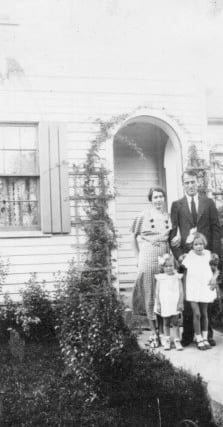
My family posing in front of our
first home. I was too young then to
grasp that my parents’ relationship
was less than close.
It was awful and strange, maybe even shocking, for me to see him so empty of emotion. But I could tell by my mother’s face that she didn’t expect more than that. This is how she wanted them to say goodbye. So that’s what she did, she said, “Goodbye, Otto,” then they were done.
I knew it would be very sad watching my parents say goodbye, and I’d braced myself for it, but I’d braced myself for the wrong thing. It wasn’t their relationship that died that day, but my hope that maybe my mother and father could manage to love each other at the very end. I always knew it wasn’t an amazing relationship, not a great relationship. But I wanted them to love each other. After all, they were my parents.
It’s only now, decades later, that I can say what I probably always knew but didn’t have words for. In that moment, when my mother had one last chance with my father, she didn’t show him she loved him. That meant I couldn’t hang onto my fantasy that my mother was going to show me she loved me, in her last chance with me.
But I can and do say to myself that yes, I did show her what taking care of someone looked like while I helped her die. I had shown her care for years, but I keep those three months in my pocket for when I need extra proof.
There was a point when we knew that death was coming soon. The hospice nurses told us to expect it any day. And I knew, I just knew the night she was going to die. She’d slipped into a coma, and I just knew it was time. I always slept in the single bed in her bedroom, but that night, I slept in the living room with her, on the sofa. I stayed up past midnight with her. She was still breathing when I fell asleep. I woke up a couple hours later, early in the morning on October 10, and checked on my mother. She was dead, as I expected.

 My Mother’s Hollow Final Goodbye Broke My Heart
My Mother’s Hollow Final Goodbye Broke My Heart


 How Dare You Die Now!
How Dare You Die Now!
 Debating Medical Aid in Dying
Debating Medical Aid in Dying















